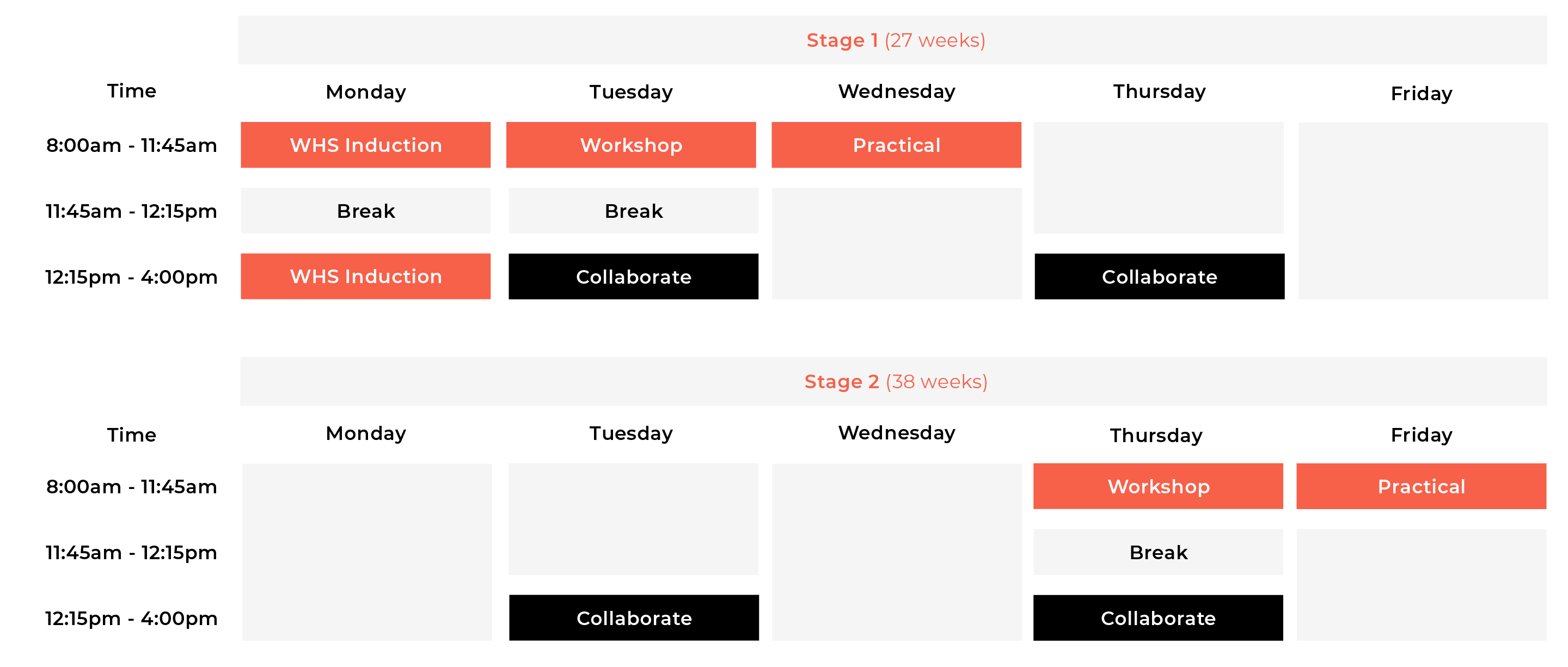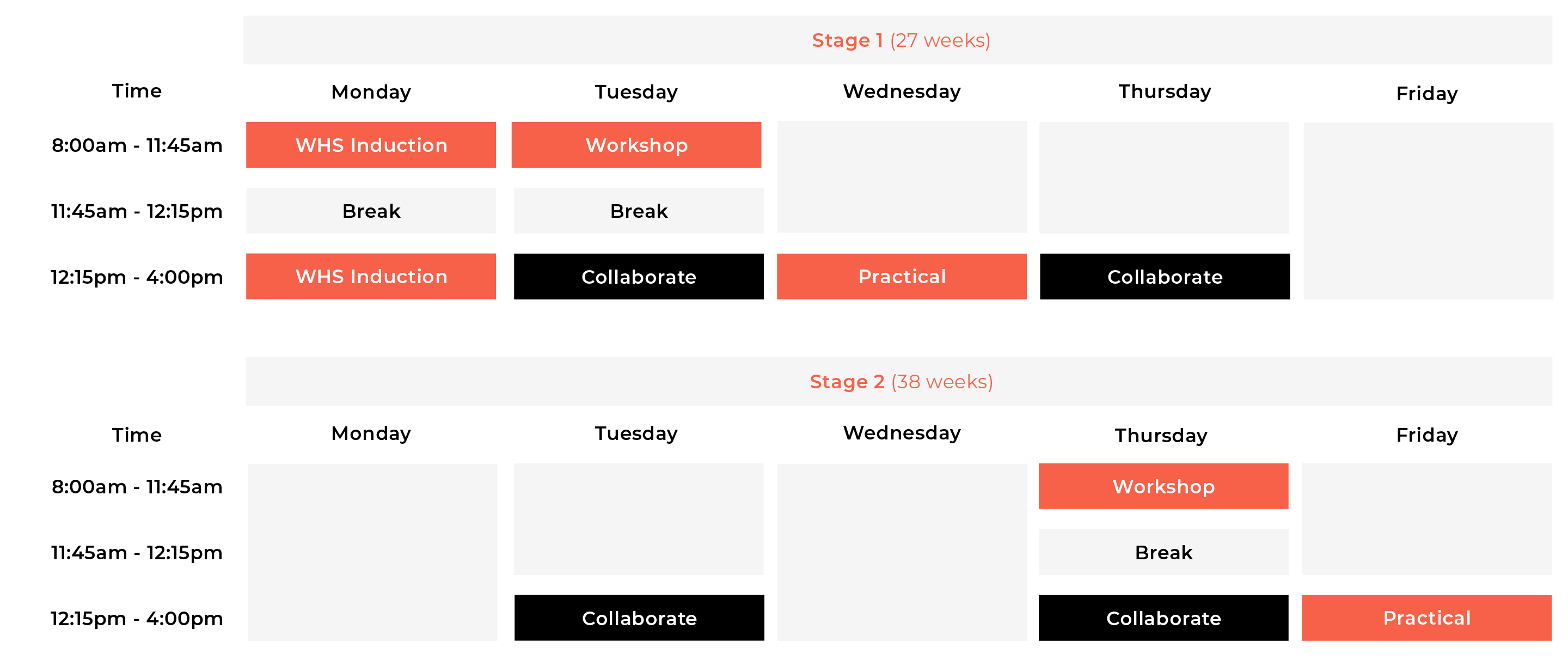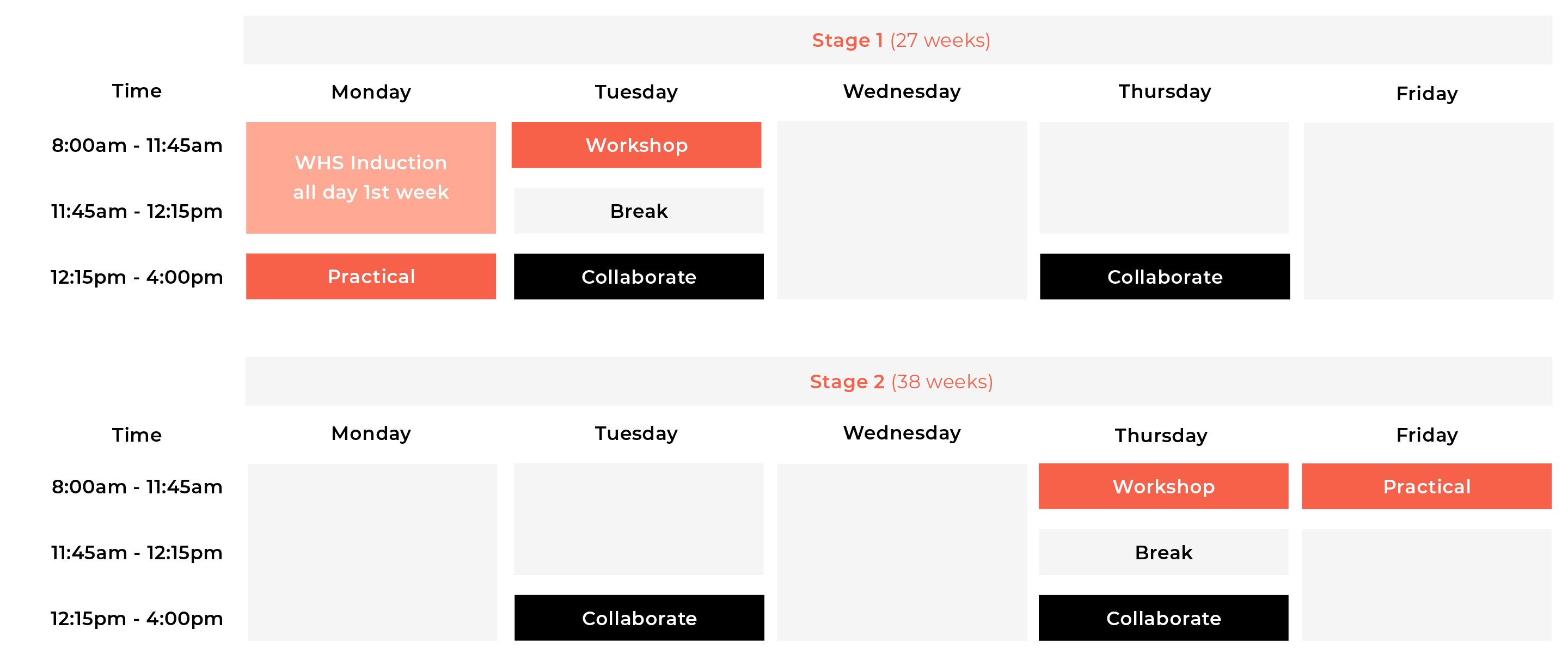CPC30620 Certificate III in Painting and Decorating
CRICOS Course Code: 104994K
![]()
![]()
Becoming a fully-trained painter and decorator offers a dedicated skill for life and can blend creativity with practical skills. You will possess a lifelong, professional skill with the chance to upskill with new products and decorating techniques along the way throughout your career. This qualification provides a trade outcome in painting and decorating for residential and commercial construction work.
![]() Monthly
Monthly
93 Weeks
Study: 65![]() weeks // Supervised Study: 7 weeks // Holidays: 21 weeks
weeks // Supervised Study: 7 weeks // Holidays: 21 weeks
Face-to-Face
![]() 15 hrs / week
15 hrs / week
![]() Distance
Distance
5 hrs / week
![]()
Painter & Decorator // Labourer // Business Owner
![]() Campus
Campus
Gold Coast
Academic Entry Requirement:
Students must provide evidence of successful completion of:
Please note: home country evidence is accepted and must be translated
English Entry Requirement:
Students must pass a minimum of one of the following English Requirements:
Please note: All English evidence provided must be within a 2 year validity period. Either within two years before the application is made, or within two years of the visa grant
Course Entry Requirement:
The following resources are required to complete this course
You may be eligible for Credit Transfers if you hold the same unit(s) from another provider. To be eligible; you must present your certified qualification at enrolment stage, together with the completed ‘Course Credit Form’. Once assessed, you will be notified of the outcome. Should your achieved units be equivalent, your CoE/course duration will be reduced according to the amount of time needed to complete the outstanding units.

CPCCWHS2001 Apply WHS requirements, policies and procedures in the construction industry (Prerequisite)
This unit will provide you with the skills to apply health and safety policies and procedures in your workplace. You will learn safe work practices, including: identifying hazards, understanding health and safety legislation and being able to respond to emergencies and incidents.
CPCCCM2008* Erect and dismantle restricted height scaffolding
Scaffolds are commonly used in construction work so workers have a safe, stable work platform when work can’t be done at ground level or on a finished floor. You will learn how to erect and dismantle restricted height scaffolding to provide work platforms for various occupational applications.
An asterisk (*) against a unit code indicates that there is a prerequisite requirement that must be met.
CPCCCM2012* Work safely at heights
This is one of the most important OHS training courses you will ever take, and it could ultimately save your life. You will undertake training required to work safely on construction sites where a worker has the potential to fall.
An asterisk (*) against a unit code indicates that there is a prerequisite requirement that must be met.
CPCCCM3001 Operate elevated work platforms up to 11 metres
Learn how to operate specific types of elevated work platforms (EWPs) safely and effectively in different locations, including on uneven terrain. The unit includes locating, setting up, operating and shutting down scissor lifts and self-propelled boom lifts with a boom length under 11 metres.
CPCCCM3005 Calculate costs of construction work
Learn how to estimate materials, overheads, labour and time requirements and establish costs for the provision of products and services for construction work.
CPCCOM1012 Work effectively and sustainably in the construction industry
Being part of a team is important and in this unit you will earn how to work with others, accept responsibility for your own workload and how to identify your development needs. You will also learn how to comply with environmental regulations and the importance of sustainability.
CPCCOM1013 Plan and organise work
Careful planning and being organised are professional skills needed in the role of any tradesperson. This unit will teach you how to plan and organise basic work tasks on a construction site.
CPCCOM1014 Conduct workplace communication
Learn how to communicate effectively with other workers and team members in a tiling workplace environment. This includes gathering, conveying and receiving information through verbal and written forms of communication.
CPCCOM1015 Carry out measurements and calculations
Ensuring accuracy in measurements and calculations while tiling is crucial. You will be required to carry out measurements and perform simple calculations to determine task and material requirements for painting & decorating jobs. In this unit you will practice your mathematical calculations during theory workshops and later you will apply these skills during vocational placement onsite at shed 101.
CPCCOM2001* Read and interpret plans and specifications
In this unit you will learn how to read and interpret plans and specifications which will enable you to carry out your work with accuracy. You will learn about the types of plans and drawings and how to read them, including: recognition of commonly used symbols and abbreviations, the identification of key features and specifications on a site plan and the comprehension of written job specifications.
An asterisk (*) against a unit code indicates that there is a prerequisite requirement that must be met.
CPCCPB3026* Erect and maintain trestle and plank systems
Most jobs in painting and decorating will use trestles at some level. Learn how to safely erect and monitor trestle and plank work platforms.
An asterisk (*) against a unit code indicates that there is a prerequisite requirement that must be met.
CPCCPD2011* Handle and store painting and decorating materials
Learn how to read safety data sheets, how to handle, sort and store painting and decorating materials keeping in mind environmental and sustainable practices.
An asterisk (*) against a unit code indicates that there is a prerequisite requirement that must be met.
CPCCPD2012* Use painting and decorating tools and equipment
Learn how to use the ‘tools of the trade’ safely and effectively in this unit. Learn the value of planning and preparation, how to identify and select tools and the importance of cleaning up your site.
An asterisk (*) against a unit code indicates that there is a prerequisite requirement that must be met.
CPCCPD2013* Remove and replace doors and door and window components
New lending data has revealed just how keen Australians are to give their homes a facelift, with the average budget coming in at a whopping $63,188. Jump on the bandwagon and learn how to plan and prepare for work, removal and replacement of doors and door and window furniture, and completion of clean-up activities.
An asterisk (*) against a unit code indicates that there is a prerequisite requirement that must be met.
CPCCPD3021* Prepare existing coated surface for painting
This unit will teach you to restore, repair and prepare different material surfaces for the application of paint.
An asterisk (*) against a unit code indicates that there is a prerequisite requirement that must be met.
CPCCPD3022* Apply paint by brush and roller
With this hands on unit, learn how to apply brushed or rolled paint coatings to different materials to form a protective and decorative painted finish. This includes preparation of the work area, mixing of materials, application of paint, finishing of the surface and completion of clean-up activities.
An asterisk (*) against a unit code indicates that there is a prerequisite requirement that must be met.
CPCCPD3023* Apply texture coat paint finishes by brush, roller and spray
Ever wondered how they texture a wall? You will learn the tricks of the trade and learn how to apply texture coat paint finishes to different surfaces using brush, roller and spray.
An asterisk (*) against a unit code indicates that there is a prerequisite requirement that must be met.
CPCCPD3024* Apply paint by spray
The age old argument to spray or roll on paint. You will find out the benefits vs disadvantages of using a spray gun and learn how to apply paint by spray onto different surfaces to form a protective paint finish.
An asterisk (*) against a unit code indicates that there is a prerequisite requirement that must be met.
CPCCPD3025* Match specific paint colours
How do you perfectly match an existing paint colour? You will discover how to do this whilst undertaking this unit and learn to colour-match new and existing painting finishes.
An asterisk (*) against a unit code indicates that there is a prerequisite requirement that must be met.
CPCCPD3026* Apply stains and clear timber finishes
Learn how to apply stains and clear timber finishes to different material surfaces, including previously stained or finished timber, to form a protective and decorative finish.
An asterisk (*) against a unit code indicates that there is a prerequisite requirement that must be met.
CPCCPD3027* Remove and apply wallpaper
Wallpaper has come a long way since the 70’s wallpaper revolution! Learn how to apply wallpaper to walls of different materials to form a protective and decorative finish.
An asterisk (*) against a unit code indicates that there is a prerequisite requirement that must be met.
CPCCPD3028* Apply decorative paint finishes
It takes skills to apply decorative paint finishes to a range of different material surfaces. Learn these skills including mirror paint finishes, broken colour effects, modern acrylic and basic stencilling.
An asterisk (*) against a unit code indicates that there is a prerequisite requirement that must be met.
CPCCPD3030* Apply protective paint coating systems
Within this unit you will be taught how to apply specialised paint coating systems as a protective measure against atmospheric conditions, sanitation and hygiene risks and the impacts of high traffic areas.
An asterisk (*) against a unit code indicates that there is a prerequisite requirement that must be met.
CPCCPD3031* Work safely with lead-painted surfaces in the painting industry
Lead was completely banned as an additive to paint in Australia in 2010 as the effects are negative to our health. Learn how to safely treat lead paint hazards. The unit includes hazard identification, preparation of the work area, removal of contaminated material, encapsulation of contaminated material and completion of clean-up activities.
An asterisk (*) against a unit code indicates that there is a prerequisite requirement that must be met.
CPCCPD3035* Prepare uncoated surfaces for painting
This unit will teach you to to prepare uncoated surfaces for the application of paint.
An asterisk (*) against a unit code indicates that there is a prerequisite requirement that must be met.
CPCCPD3036* Work safely to encapsulate non-friable asbestos in the painting industry
Asbestos is no laughing matter. Australia was one of the highest users of asbestos per capita in the world up until the mid 1980s. Learn how to to safely encapsulate non-friable asbestos hazards within this unit and dispose of it safely.
An asterisk (*) against a unit code indicates that there is a prerequisite requirement that must be met.
CPCCPD3029* Remove graffiti and apply anti-graffiti coatings
The annual costs to remove graffiti in Australia exceeds more than $2 billion, $200 million per year for Queensland alone. We will teach you the best methods to remove graffiti and apply preventative materials to different surfaces to form graffiti-resistant surface systems.
An asterisk (*) against a unit code indicates that there is a prerequisite requirement that must be met.
BSBESB301 Investigate business opportunities
Now it’s time to start your own business. You will learn to identify a business opportunity and its key components. This requires undertaking research to determine the viability of the opportunity, with reference to the legislative frameworks affecting the business.
BSBWHS414 Contribute to WHS risk management
Safety must come first in any workplace. In this unit you will learn how to identify and assess hazards, control risks as well as manage workplace compliance requirements.

CLASS 1

CLASS 2

CLASS 3

Please note; Timetables are subject to change.
Workshop
During this time your mentor will deliver planned training sessions which are aimed to give you theoretical knowledge and understanding of course concepts.
Collaborate (facilitated learning & project work)
During this facilitated time, you will work collaboratively with your peers, to complete tasks that have been delivered in the workshop sessions. You will practice skills that you have been taught by your mentor and work on assessments.
Practical
During this session, you will practice demonstrating required skills in a real and simulated work environment.
Canvas (Learner Management System)
Canvas is your online learning portal. Within this platform, you will be able to access your course learning materials, assessment requirements, and marked submissions. You will also be able to communicate with your Mentor within this platform, outside of timetabled hours. The system is user friendly and will help keep you on track throughout your studies.